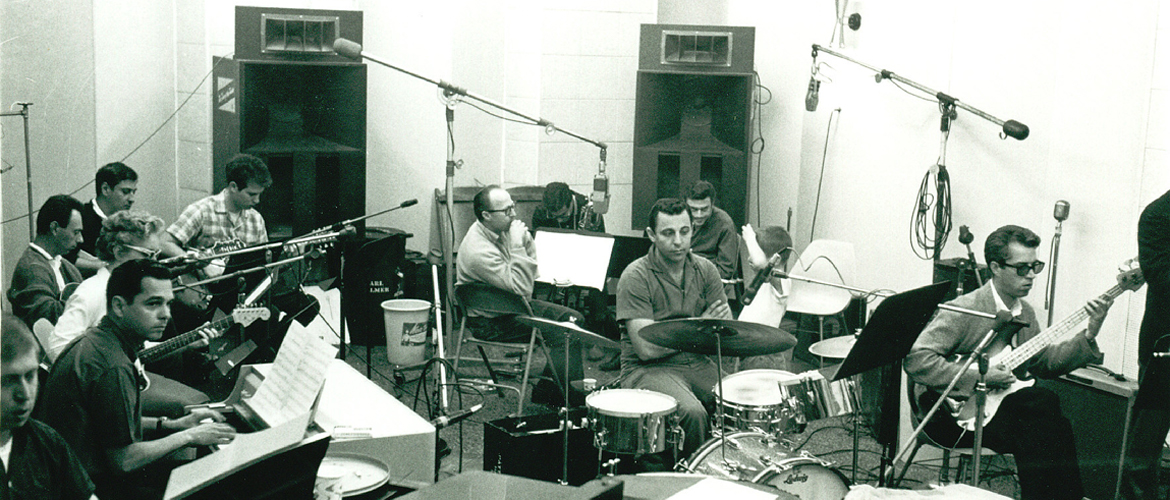 As we sat in the sunshine outside Priscilla’s Coffee Shop in Burbank, California, Denny Tedesco tried to talk me down off the ledge.
As we sat in the sunshine outside Priscilla’s Coffee Shop in Burbank, California, Denny Tedesco tried to talk me down off the ledge.
“People tell me they don’t make music like they used to,” he said. “I disagree.”
I had told him that I found the pop music of the day a travesty in human evolution, despite the blood oath I took at 22 not to turn into my parents.
Tedesco is the producer and director of The Wrecking Crew, the best documentary I saw in 2015. His father, Tony Tedesco, was a member of the Wrecking Crew, a group of studio musicians who were the real heroes behind so many of the rock and roll hits of the sixties. It’s their stories he chronicled in his film.
We shouldn’t have bought all those 45s, swooned over our favorite groups when we saw them in concert, wiggled our tushes to American Bandstand or otherwise encouraged the Wrecking Crew to keep on innovating.
“There are great songwriters and great musicians out there,” he continued. “The problem is, when we were kids, we only had a few radio stations and a certain amount of labels available. Now, anyone can get music in hundreds of different ways. But we still only have 24/7. So I know there’s a Brian Wilson out there, a Paul McCartney, a John Lennon, it’s just how do you find them.”
If a musician plays in the forest and I can’t hear her, it really doesn’t matter, I argued. The music I do find bears little resemblance to the music that drove our parents crazy in the sixties.
“Perhaps not,” Tedesco said, “but what the Wrecking Crew did was lay down the groundwork for everybody else. One young musician I know said that you can hate everything that Hal Blaine or Earl Palmer ever did, but you can’t say you were never influenced by them.”
Those complaints we have about today’s popular music? Our fault. We shouldn’t have bought all those 45s, swooned over our favorite groups when we saw them in concert, wiggled our tushes to American Bandstand or otherwise encouraged the Wrecking Crew to keep on innovating.
Irony. Just what I needed.
“The shame is, too many young artists don’t approach today’s music with an appreciation for its past,” Tedesco said, I’m sure in an effort to distract me. “You say to a kid learning art, ‘Monet and Picasso,’ and the response is, ‘Who are they?’ Well, they should know who they are because that’s the basis of what they’re doing now. If you’re making an album today you’re taking the tricks that they did 40 or 50 years ago. They ought to know that.”
I expressed skepticism that an appreciation of Hal Blaine, Earl Palmer or even Carol Kaye, the group’s only regular female musician, would change the nature of popular music. Tedesco agreed, still hoping to talk me down.
“Conversation,” he went on. “That’s what’s missing in today’s recordings.”
Not the conversation we were having over coffee, lubricated by caffeine and sunshine, but the non-verbal kind.
“When they recorded all those rock hits, the musicians had to be together in the same room. It wasn’t a choice, it was the only way to do it. The riffs, the chords, the beats, they were all part of a back and forth musical conversation among a group of artists.” Digital technology did to those conversations what Facebook and Twitter did to the morning coffee klatch.
“Nowadays, you don’t make records that way,” Tedesco said. “You lay down the drums, the brass, you layer it. It’s too pure, too perfect.”
Now I was at the edge. Perfection? A problem? In a world where computers earn their spending money on Jeopardy!?
“There are no mistakes today,” Tedesco said, “but mistakes were part of the conversation.” And more than one mistake contributed to rock’s music signature.
“You may remember, in the Mamas and Papa’s I Saw Her Again, there’s a point near the end of song where they’re singing, and then it sounds as if they start over. It was a mistake. The engineer rolled a tape too soon. But when the producer heard it he loved it. That’s how they released it. It was a distinctive sound.”
Tedesco looked into his coffee mug and wondered aloud whether that sort of creative faux pas could happen again in a world where mistakes are career limiting and conversations take place between business people instead of artists. “It’s not that this is good or bad,” Tedesco concluded, “it’s how it is.”
Let’s see. Nobody talks to each other. The music I don’t like is descended from the music I love. And it’s all my fault.
I feel more like my parents than ever.
Denny Tedesco’s first job was in commercials as a 17-year old kid eating pizza for a Pizza Hut commercial. The line, “more mushrooms and more pepperoni” gave him the taste of show biz and over the last 35 years he’s traveled around the world, working in various film industry roles. While attending Loyola Marymount University, he started his real film career as a set decorator on low budget feature films. After college, he worked as a grip and electrician during the hey day of rock and roll music videos with such acts as; The Ramones, Sting, Beach Boys, Chicago, Billy Idol, Janet Jackson, Robbie Nevil, and many more. Prompted by his father’s cancer diagnosis, The Wrecking Crew began as a two-year project in 1996. Nineteen years later, and after coming up with unique marketing ideas to raise the $750,000 to pay off the music licensing rightss the self-financed documentary tribute to the session players of the LA music studio scene in the golden era of music has won numerous awards. Following a hugely successful Kickstarter campaign the film was pick up for distribution by Magnolia Pictures and now after a very successful theatrical run the film is currently on Netflix.
Start your Sunday with a laugh. Read the Sunday Funnies, fresh humor from The Out Of My Mind Blog. Subscribe now and you'll never miss a post.
Mind Doodle…
Puff the Magic Dragon is banned in Hong Kong because of its supposed drug references. Co-writer Peter Yarrow says, “What kind of a mean-spirited SOB would write a children’s song with a covert drug message?” I’ve met Yarrow and I respect him. Still, does anyone know what any sixties’ cultural reference actually meant?

Have to disagree with you on this one Jay. I love a lot of today’s music. I got it from my grandkids and followed it because of them. Then I started following and downloading on my own. Some of it is surprisingly great. I also knew a hell of a lot about the dawn of rock and roll because I was there. My band played every friday at the t-dance at the local playground in the late 50s. In the 60s we did weddings and the played in a bar every weeked for years. We did Elvis and the Everlys and Fats Domino and Bill Hailey.. A little bit of this is referenced in my novel Bloody Bess. Great times. Great memories.
Hi Nick…
As a listener, and not by any means a musical expert, though, I find much of what I encounter not worth listening to (IMHO). I think many of the songs lack lyrics that are poetic and/or narrative. The production is too slick. I miss the spontaneity of some of the rock music I grew up with. As Denny said in the piece, discovery is difficult. Maybe that’s my problem—I’m only hearing the music that’s being promoted by major labels and that is not representative of the range of music available. This is why I’m a fan of human curation in the arts. But that’s another story.
–jay
Interesting points. It’s always been the Music ” Business” but you’re right, now it’s more about appearance and perceived marketability than actual musical abilities. But just like we talked about how book sellers have to adapt because the ease of self publication, it’s the same thing with music. It’s just harder to search out
Hi James…
You and Denny make the same point. There’s good music out there, but it’s harder to find. And, that’s the double-edged sword. On the one hand, there’s all that good music. On the other hand, much of it is invisible unless a record label or celebrity promotes it. (Yes, some artists are fortunate enough to have their work go viral and pick up a following, but that’s a fraction of the talented ones toiling in obscurity.) Personally, I’m in favor of curation. I’m also, I’m afraid, in the minority.